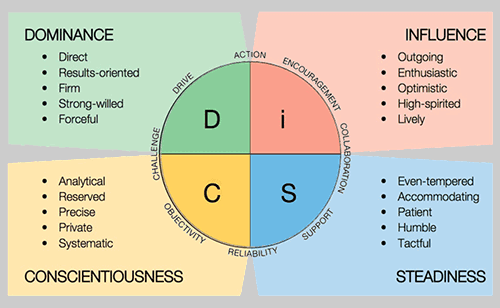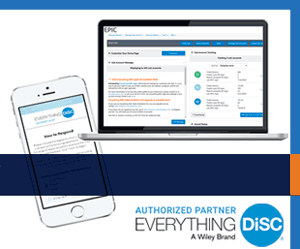Whether you are a veteran or new to the managing scene, anyone that deals with running a team know that managing people is no simple task. More than 60% of new managers fail within the first year and over 70% report they do not get what they need to be successful in their role.
This is not only stressful for the managers but the employees as well. Bad management can cause employees to feel under-appreciated, frustrated and stressed out, leaving them uninterested in their work and looking for a way out.
DiSC Management Profiles offer strategies to understand your own management style, your teammates’ personalities and finally how you can use this information to better motivate and develop your team.
Introduction to the Five Fatal Management Mistakes with the DiSC Profile
1. Not Knowing Yourself
It may sound obvious but all too many managers don’t have a firm idea of their own management style. The first step to being an effective leader is developing an understanding of your own personal motivations as well as individual strengths and weaknesses.
What kind of manager are you? There isn’t one personality mold that fits all managers. What works for the fast-paced and strong willed manager might not work for the analytical and systematic. Learn which of these four DiSC profiles most closely aligns with you and how your management style fits in your team.
2. Misunderstanding Others Priorities and Abilities
When you look at your team what do you see? If you are honest, you have probably neatly categorized and labeled them in your head. But do you really understand your team members on a fundamental level or have you sold some people short? Don’t fall into the trap of defining someone by what you believe they can do. Learn what makes them tick and what motivates them so you can support them in reaching their full potential.
Everyone on your team has different personalities, working styles, and needs. As a manager, it’s your job to work with those differences. Some people may need more encouragement, some more direction, while others may need a greater challenge. By better understanding their personalities you will be able to guide instead of just define them.
3. Giving Unclear, Ambiguous Direction
Unclear direction can be a large stumbling block when it comes to how your team performs. Your team wants to succeed and to deliver what is expected. Though problems can arise when there is a disconnect between your expectations and what your team thinks you expect. Each team member will process and take direction differently. A key factor in their performance is their individual personality style.
The team member with a D (Dominance) personality, for example, is driven, works fast and asks a lot of questions, which can be perceived as challenging. How do you direct and delegate this team member? Well to answer that question you need to understand what motivates them.
A person with a D-personality is highly result-oriented, so when giving direction it is best to show them the “big picture” purpose of a task as well the potential successful outcomes.
If they have proven themselves in the past, show them that you respect their abilities. Give them a little more autonomy, but make sure you see eye-to-eye on the goal of the assignment and the consequences of shortcuts.
4. Failing to Address Basic Needs and Preferences
Harmony, acceptance, action, facts…. What if people had their needs written all over them? It sure would make it easier to give people the support they needed in the workplace. As that is not the case, many managers are left at a loss when it comes to how to best support their team members. With DiSC profiles, managers can better understand what their team members need to thrive.
For example, a team member with an S (Steadiness) personality, needs harmony and stability, and conversely, fears rapid change and letting people down. For this particular style, being in chaotic situations, or being forced to improvise or deal with cold or argumentative people is stressful and demotivating.
How can we go about creating a motivational atmosphere for this personality? Make sure they have ample time to achieve results, even if it means slowing your pace down a bit. Additionally, be sure you provide the structure and security needed for her to feel comfortable and when changes are coming make sure you plan ahead to be able to give her plenty of warning.
Other personalities will have varying needs, but understanding these needs is the first step in creating a supportive environment and a harmonious workplace.
5. Delivering Inappropriate Unbalanced Feedback
Make sure your feedback counts! As you begin to develop a better appreciation of the different working styles, you’ll learn how to approach them individually. Listening, encouraging and helping particular styles are just some of the ways you can deliver the proper response they need to help motivate them.
Once you have a thorough understanding of your team member’s value in the workplace, you can respond with constructive feedback that they can successfully utilize to achieve their goals.
Our webinar provided valuable information on:
- How to identify your own management style
- How DiSC styles impact management behavior
- Ways DiSC helps you delegate, motivate and develop others
- How the group’s culture can impact employee relations and retention
DiSC profiles are designed to help you as a manager develop a better understanding of yourself and your team so you can ultimately help them unlock their potential.
Application
If you see yourself falling into these patterns of mistakes or simply want to become a better manager, applying DiSC Profiles can help get you started on the road to success.
It starts with understanding who you are as a manager and how you can learn to better support your team among the different working styles. Everything DiSC Management is the ideal tool to help improve your management skills and, ultimately, your company culture.
Can you benefit from using the research-validated online profile assessments like DiSC? Corexcel can provide the tools and training you need to use for creating a more cohesive workplace. Sign up for Corexcel’s mailing list to get started on your successful management journey today.
“DiSC” and “Everything DiSC” are registered trademarks of John Wiley & Sons, Inc.





